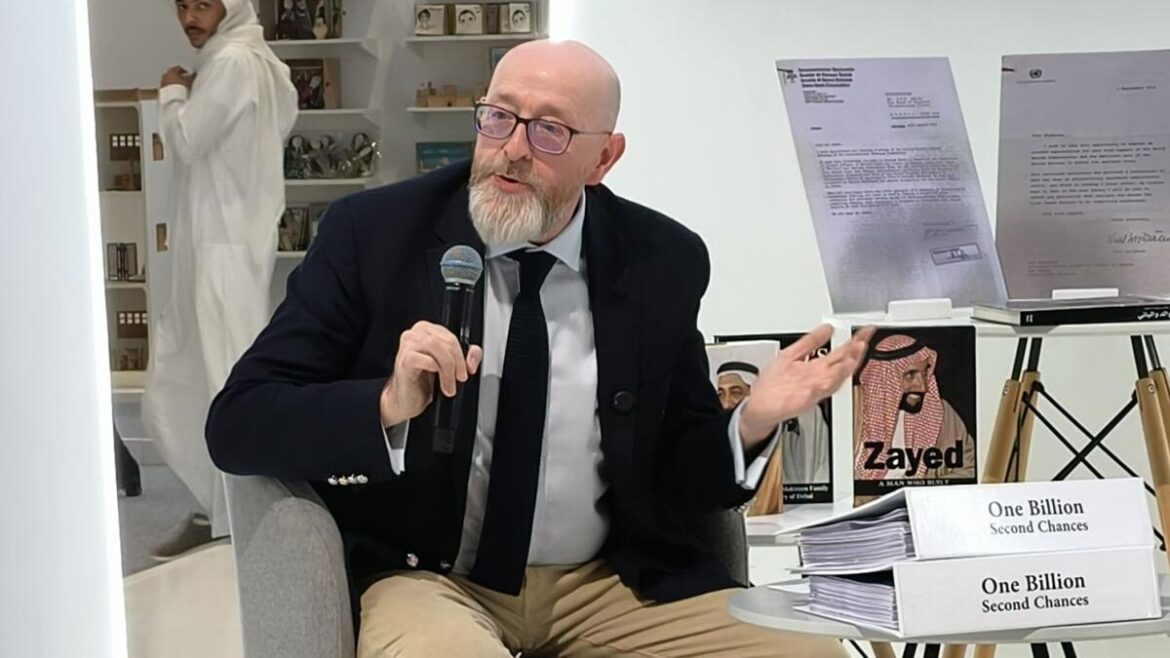By Staff Reporter
“I have a story.” It is how British author Graeme Wilson, who has called the UAE home since 1990 and written some 50-odd books, including dozens of biographies on world leaders, begins most of his conversations.
The late Sheikh Zayed bin Sultan Al Nahyan, late Sheikh Rashid bin Saeed Al Maktoum, Sheikh Mohamed bin Zayed Al Nahyan, and Sheikh Mohammed bin Rashid Al Maktoum are among the leaders who have collectively impacted a billion lives globally.
At a session held during the closing hours of the Abu Dhabi International Book Fair, Wilson displayed two volumes of his research works, covering 2,000 budget allocations by the rulers in 165 countries.
He revealed the role of Sheikh Zayed and Sheikh Mohammed in the ban on commercial whaling, which peaked in the 1980s and pushed some species to the brink of extinction.
“Sheikh Zayed and Sheikh Mohammed bin Rashid were funding the scientific research, which led to the global ban on commercial whaling in 1982. Whales are here now because of the Founding Father and Sheikh Mohammed. The UAE never had any history of whaling, but these two leaders still reached out and achieved these amazing results,” he said, displaying documentary evidence.
The chocolate story
Similarly, when the African elephant population was declining in the early 1980s because of poaching, Sheikh Zayed, on a request from the UN secretary-general, funded a census across the continent.
“Across 39 countries of Africa, Sheikh Zayed paid for a census. The results were so shocking that when the report came out, there was a global ban on ivory purely because of Sheikh Zayed. He saved the African elephants.”
Wilson perked up talking about how Sheikh Zayed played a hand in uplifting Ivory Coast’s cocoa production industry.
“Up until the 1980s, it was a small cottage industry. Today, in the Ivory Coast, about 500,000 families and 100,000 women are socio-economically empowered because of cocoa production. Sheikh Zayed invested three or four times in the industry in the Ivory Coast. So, when you’re eating a bowl of chocolate, it’s Sheikh Zayed who has put it there.”
A personal touch
Sitting in the booth of the HH Sheikh Mohammed Bin Rashid Al Maktoum Publications, Wilson recollected another heartwarming story told to him by a woman minister.
“Once a minister went to see Sheikh Mohammed in his Majlis. She had a cold. Sheikh Mohammed sees her, leaves the Majlis, and comes back with a potion. He says it’s his mother’s traditional potion. It’s a personal touch and one of the most beautiful stories.”
Soon, Wilson rolled out another gem of a story when former British Prime Minister Margaret Thatcher visited Dubai in 1981 and was wowed by a “well-organised, bright, and aesthetically pleasing” which was “overseen by a son of the Ruler of Dubai who is in his early 30s”. In a letter to her private secretary, Thatcher poses the question: “How Sheikh Mohammed can achieve this when the combined experience of HMG (Her Majesty’s Government) and Heathrow are unable to deliver the same or better?”
‘Don’t lie to Sheikh Mohammed’
“You don’t tell Sheikh Mohammed lies, because he’ll remember you. When you give a report, you have to be accurate. You don’t miss anything because he will pull you up on it later. And I got that from Tony Blair, Jimmy Carter, Bill Clinton. He has unbelievable memory,” Wilson said and gave two instances of how Sheikh Mohammed caught lies.
One was the story of an American horse trainer who didn’t give the true picture to the ruler on the well-being of a new horse. The trainer, when asked on a second occasion, finally apologised.
“Even if we don’t tell him the truth, he knows anyway. Everybody who works for Sheikh Mohammed says don’t tell lies, tell him the truth, even if it’s bad news.”
There is another story of a major infrastructure project, which was running behind schedule unknown to the project lead. Asked by Sheikh Mohammed about the development, the project head maintained that it was on track. However, when repeatedly asked on several occasions, he checked and found out that he was running behind schedule. “And he delivered the project on time.”
Important to record stories
Wilson noted that the late Sheikh Khalifa and President Sheikh Mohamed have done several projects globally, which aren’t known yet.
“Sheikh Rashid was the world’s largest private donor for cancer research in the 1960s. And nobody knows. These leaders did these things not for personal glorification, not even for soft power. They did these things because it was right. You travel the world and stumble on a school or a hospital, and people don’t know Sheikh Zayed put it there. Sheikh Zayed didn’t put his name on these things. You are talking about swathes of the world funded and impacted by leaders of the UAE.”lson highlighted that it’s important to record such instances otherwise they will get lost.“The people around Sheikh Zayed and Sheikh Rashid are disappearing. They’re dying. When these guys go, these stories are also gone. It’s our job to record this stuff. Because if we don’t, we won’t remember Sheikh Zayed in 50 or 100 years, so much of it will be gone,” said Wilson, who keeps travelling, meeting, talking to people, and mining archives to find rare gems of stories.
Some of his works include ‘Zayed – Man Who Built a Nation’, ‘Father of Dubai: Sheikh Rashid bin Saeed Al Maktoum’, ‘Rashid’s Legacy: The Genesis of the Maktoum Family and the History of Dubai’.
Wilson will be releasing a biography of Sheikh Mohammed next month.
“It’s a dynamic book, which talks about the man, his approach to things, anecdotes, and stories. It’s the greatest book I have ever written.”


